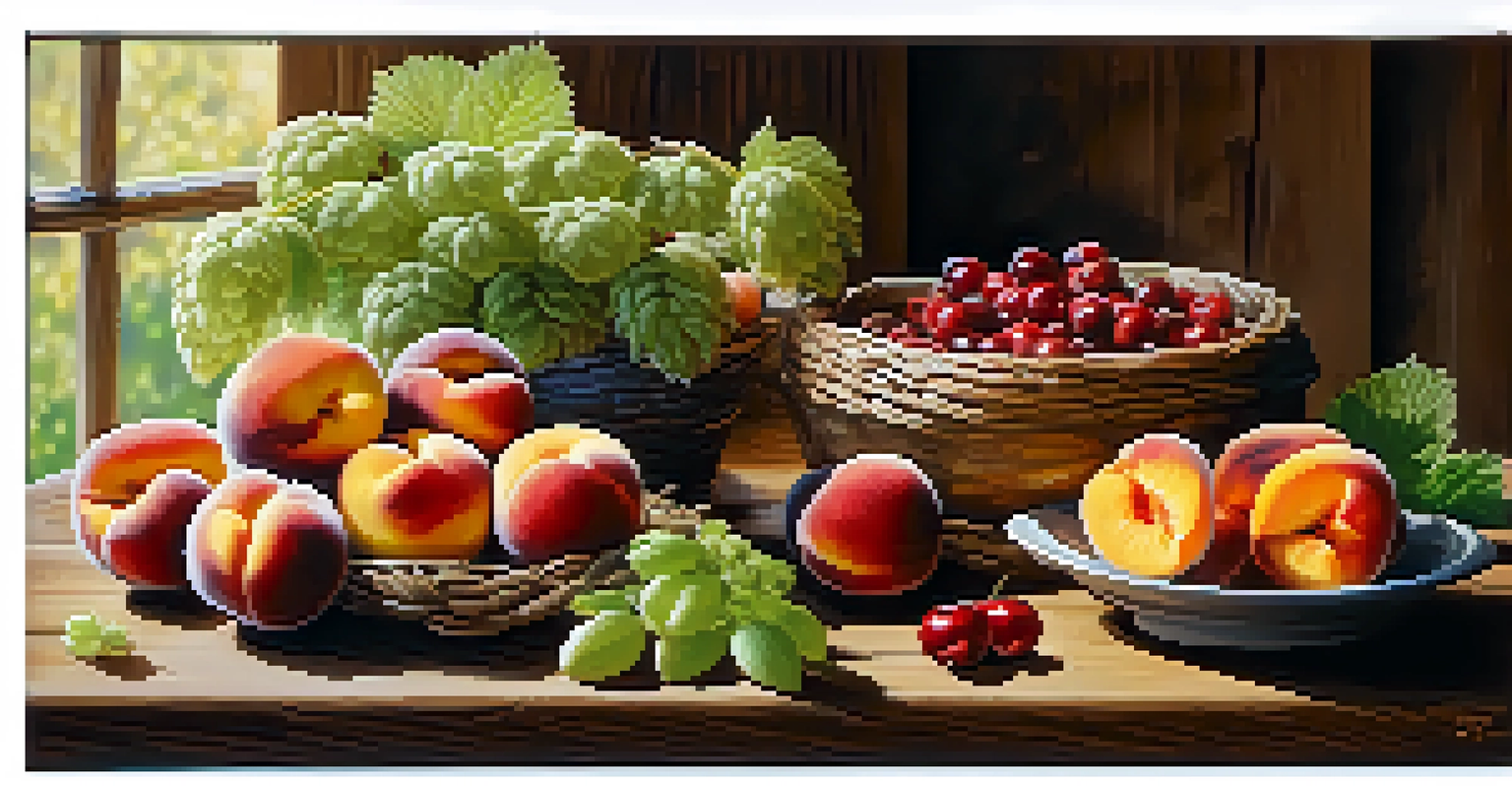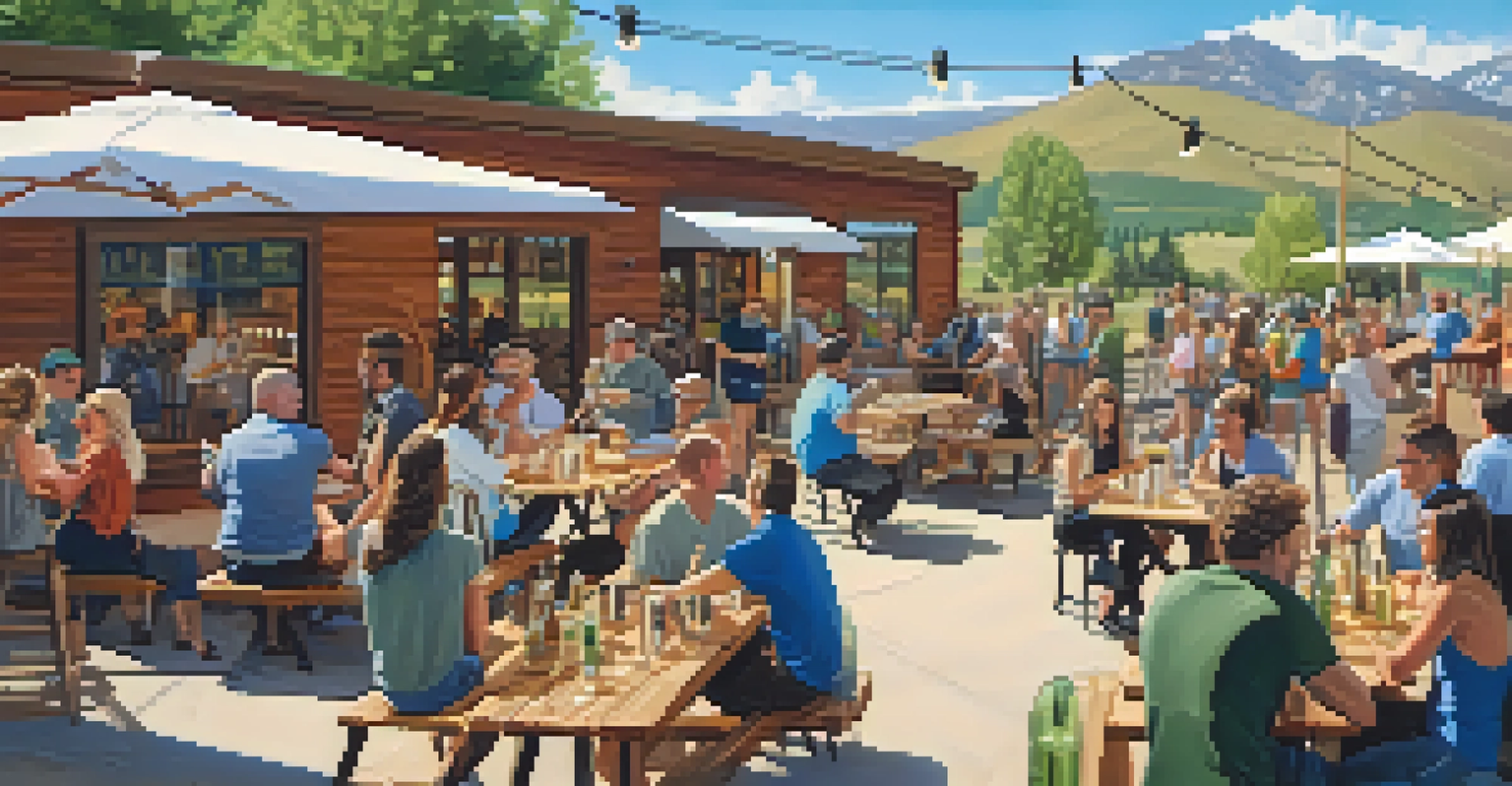Local Ingredients: The Heart of Colorado's Craft Beer

The Rise of Craft Beer in Colorado
Colorado's craft beer scene has exploded over the past two decades, with breweries popping up in cities and towns across the state. This growth is not just a trend; it's a testament to the creativity and passion of local brewers. They have embraced the unique flavors of Colorado, turning them into signature brews that tell the story of their surroundings.
Craft beer is a conversation starter, connecting people through shared experiences and local flavors.
With over 400 breweries, Colorado ranks among the top states for craft beer production. This vibrant landscape has attracted beer enthusiasts from all over, eager to taste the innovative creations that use local ingredients. The marriage of tradition and local flair has created a dynamic brewing culture that continues to evolve.
Whether it's a refreshing pale ale from the foothills of the Rockies or a rich stout brewed with local coffee, each beer offers a unique taste of Colorado. The emphasis on local ingredients not only enhances flavor but also fosters community connections, making each pint a shared experience.
Why Local Ingredients Matter
Using local ingredients in craft beer not only boosts flavor but also supports local economies. When brewers source their grains, hops, and other components from nearby farms, they create a closed-loop system that benefits everyone involved. This practice strengthens community ties and nurtures a sense of pride among both producers and consumers.

Moreover, local ingredients often reflect the unique terroir of Colorado. Just as wine enthusiasts appreciate the nuances of grapes from specific regions, beer lovers can savor the distinct flavors of hops grown in the state's diverse climates. This attention to local sourcing results in beers that are not just beverages but expressions of place.
Craft Beer Thrives in Colorado
Colorado's craft beer scene has flourished, with over 400 breweries showcasing local flavors and ingredients.
Also, many local breweries engage in sustainable practices by minimizing transportation and reducing their carbon footprint. By investing in local agriculture, they help preserve the environment while crafting distinctive beers that resonate with the ethos of the community.
Spotlight on Local Hops
Hops are a critical ingredient in beer, responsible for bitterness, flavor, and aroma. In Colorado, several farms specialize in growing hops, which has led to a rich variety of flavors that local brewers are eager to explore. From fruity and floral to earthy and spicy, these homegrown hops add a unique twist to many craft beers.
The best beers are the ones that tell a story, and every ingredient plays a part in that narrative.
One notable example is the use of Cascade hops, which thrive in Colorado’s climate. These hops impart a citrusy aroma that pairs beautifully with pale ales and IPAs. Breweries like New Belgium and Odell Brewing Co. have made a name for themselves by showcasing these local hops, contributing to the state’s reputation for high-quality craft beer.
Additionally, the push for local hop cultivation has sparked a movement among homebrewers and craft breweries alike, leading to experimental brews that highlight these unique ingredients. This commitment to local hops not only enriches the beer but also encourages innovation within the craft brewing community.
Grains: The Backbone of Craft Beer
While hops are the star of many brews, grains are the backbone that provides body and flavor. Colorado's high-quality barley and wheat contribute to the rich, full-bodied beers that locals love. Many breweries partner with local farmers to source these grains, ensuring freshness and supporting sustainable agriculture.
For instance, the Colorado Malting Company supplies a variety of malts that are used by breweries across the state. Their commitment to quality and local sourcing ensures that brewers have access to the best ingredients, allowing them to create exceptional beers that highlight the unique characteristics of Colorado grains.
Local Sourcing Enhances Flavor
Using local ingredients not only boosts the taste of craft beer but also supports community pride and sustainability.
By using locally grown grains, breweries can craft beers that resonate with the land, enhancing the overall experience for consumers. This connection between the soil and the glass not only elevates the beer but fosters a deeper appreciation for the agricultural landscape of Colorado.
Water: Colorado's Hidden Treasure
Many people overlook water as a key ingredient in brewing, but in Colorado, it plays a crucial role in crafting exceptional beer. The state is home to pristine mountain streams and aquifers that provide clean, mineral-rich water, essential for brewing quality beer. Each region’s water profile can significantly influence the taste and style of the beer produced.
Breweries like Avery Brewing Co. take great care in sourcing their water to match the specific styles they brew. For example, the high mineral content of their water is ideal for producing hoppy IPAs, while softer water is better suited for delicate lagers. This attention to detail ensures that every brew is not only crafted with passion but also tailored to perfection.
By utilizing Colorado's natural water sources, brewers can enhance the overall character of their beers, making them truly one-of-a-kind. This often-overlooked element underscores the importance of local sourcing in the craft beer industry.
Fruits and Botanicals: A Flavorful Twist
Colorado's diverse climate allows for the cultivation of unique fruits and botanicals that brewers love to incorporate into their beers. From tart cherries to fresh herbs, these local ingredients add exciting flavors and aromas, making each brew a delightful discovery. Many breweries are experimenting with seasonal ingredients to create limited-edition offerings that celebrate the state's bounty.
For instance, the use of Palisade peaches in summer ales creates a refreshing twist that captures the essence of Colorado's fruit harvest. Similarly, local wildflowers and herbs can infuse beers with aromatic qualities that enhance the drinking experience. This creativity not only showcases local flavors but also keeps the beer scene dynamic and engaging.
Community Ties Through Brewing
Local breweries foster strong community connections by hosting events and collaborating with nearby farms.
As breweries continue to push the boundaries of flavor, the use of local fruits and botanicals will remain a vital part of Colorado's craft beer identity. These innovative brews invite everyone to experience the vibrant agricultural landscape of the state, one sip at a time.
The Community Connection
Craft beer in Colorado isn't just about the ingredients; it's also about the community that surrounds it. Local breweries often host events, collaborate with local farms, and engage in charitable initiatives, creating a strong bond with their communities. This sense of belonging makes every pint poured a shared celebration of local culture.
Many breweries source ingredients from nearby farms and incorporate them into community events, highlighting the importance of local sourcing. For instance, a farm-to-table beer dinner not only showcases delicious food but also emphasizes the connection between the land and the beer. This collaboration fosters a sense of unity and pride among local producers and consumers.

By choosing local ingredients, breweries are not only crafting exceptional beers but also strengthening the fabric of their communities. This commitment to local sourcing and collaboration ensures that Colorado’s craft beer scene remains vibrant and deeply connected to the people and places that make it special.